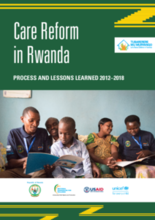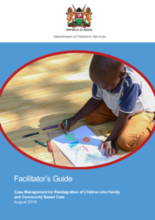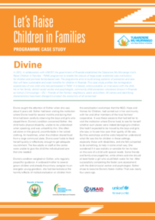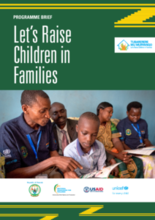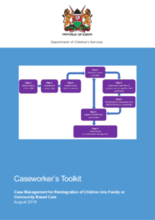Displaying 441 - 450 of 991
This paper documents the care reform process and presents key lessons learnt. It is based on a review of Rwandan policy and programme documents and on interviews and focus group discussions with 65 stakeholders.
This Facilitator’s Guide is for use by the varied facilitators of the 'Promoting Family- or Community-Based Care Using a Case Management Approach Workshop,' including national and county trainer of trainers from Kenya's Department of Children's Services, and trained staff from other care reform partners.
This case study profiles the reintegration experiences of one child who has participated in the Tubarerere Mu Muryango (Let’s Raise Children in Families - TMM) programme in Rwanda.
This programme brief is part of a package of materials documenting successes and lessons learnt from implementation of the Tubarerere Mu Muryango (TMM) child care reform programme between 2012 and 2018.
This toolkit contains caseworker forms for: conducting child and family assessments, consent and assent from caregivers and children, case planning, placement of children and young adults, monitoring, case reviews, case closures, referrals, caregiver and child feedback, and more.
The primary aim of this study was to explore individual characteristics that could predict the quality of life and level of distress of foster care alumni.
The aim of this article [from the Child & Family Social Work special issue on teenagers in foster care] is to account for and discuss support to young care leavers within the comparable welfare regimes of Norway and Sweden and to explore key differences between these 2 countries.
This paper explores practice examples relating to young people's transitions from care to adulthood.
This paper explores how the principle of linked lives can illuminate our understanding of how relationships positively influence the educational journeys of adults with care experience over time.
This paper explores how the principle of linked lives can illuminate our understanding of how relationships positively influence the educational journeys of adults with care experience over time.

